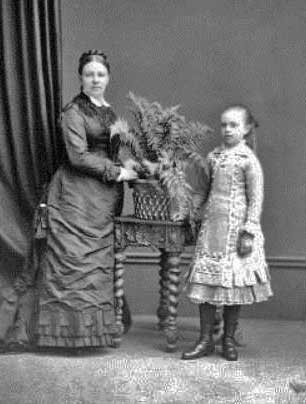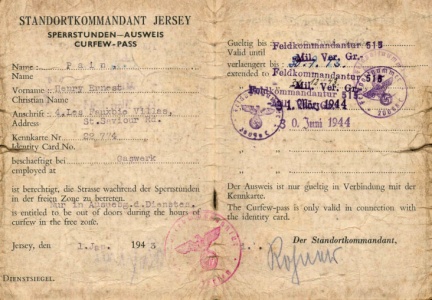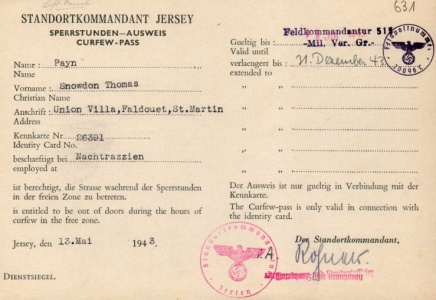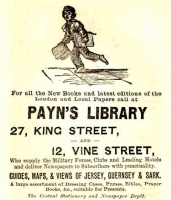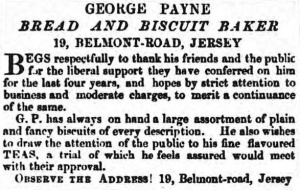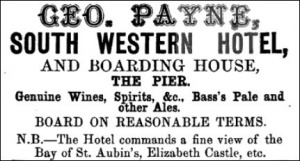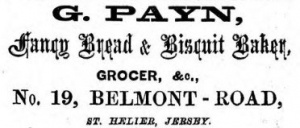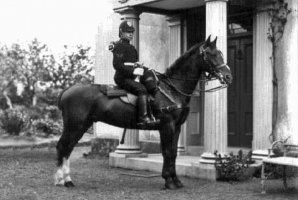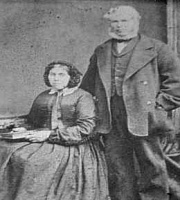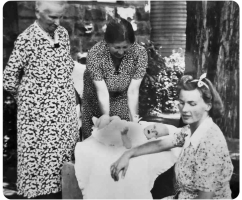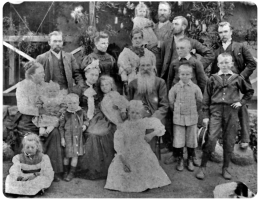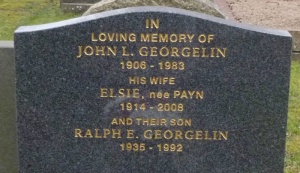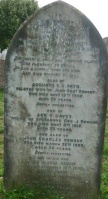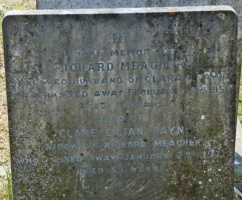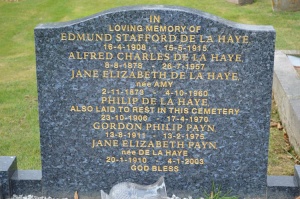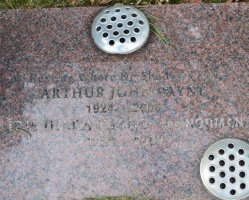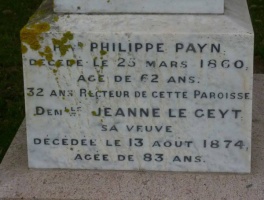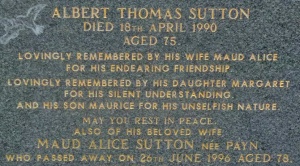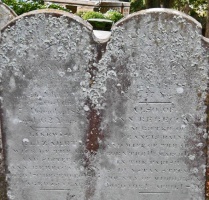Origin of Surname
Payn, Le Paien, was regarded as a heathen, according to the Rev George Balleine. In the Extente of 1331 the name is "Paganus vel Payn". The name comes from old Frence paien, translated as someone who did not attend mass and practice Christian rites.
However, although agreeing that the name is derived from the Old French male personal name "Paien", itself coming from the Latin "Paganus", more recent sources suggest that the Latin name is a derivative of "pagus", meaning outlying village, and meant at first a rustic, then a civilian as opposed to a soldier, and finally a heathen (one not enrolled in the army of Christ).
In the early Middle Ages, Paien was popular as a personal name, due to the romantic associations of its early meaning of "rustic, country-dweller", and examples of same include: Edmund filius (son of) Pagen, noted in the Domesday Book of 1086 for Somerset, and Reginaldus filius Pain, entered in the 1185 Knights' Templars Records of Lincolnshire. In 1220, one William Paen was recorded in the Curia Regis Rolls of Somerset, and a Ralph Payn appears in Records of Cambridgeshire, dated 1221. Notable 15th Century namebearers include: Peter Payne, principal of St. Edmund's Hall, Oxford, 1410-1414, and John Payne, Master of the Rolls in Ireland (1496).
Early records
G F B de Gruchy writes that "we first find mention of the name in Jersey in the Roll of the Exchequer, 1180. In a close roll of 1227, we find the name of Radulphus [Raoul] Pagany, but this may refer to the name Paisnel. In 1254 Guillaume Payn served on an inquest. In the Extente of 1274, we find that three of the name were Jurats, Radulphus, Laurencus and Henricus Paganus, of which the first two held land in St Clements and St Lawrence, respectively. In a petition of 1304 we find that Guillaume, the son of Raoul Payn, claimed the Manor of Rosel against Drogo de Barentin; on what grounds is not stated, but presumably as a descendant of the de Furnet family, holders of Rosel in the late 12th and early 13th centuries. In the Assize Roll 1309, among other bearers of the name we find that Raoul Paien had held a fief in Trinity which Raoul Godel then held (probably the Fief ès Godeaux) and that Thomas Paien had held a messuage in St Helier, which Guillaume, his son, then claimed. In..1331 we find Jourdain Paien held the Fief de la Godelière..in St Helier, Jourdain Paien, probably not the same, held half of the Fief Payn, St Ouen, and others of the name in St Lawrence and St Saviour. In addition to the above three Jurats of 1274, Thomas and Henri were Jurats in 1292, Guillaume a Jurat in 1324, Jourdain a Jurat 1331-1348, and Guillaume Jurat 1352-1367, and so on until the present day..we find beares of this name filling the post of Jurat and other high offices in the Island service and in the Church, too numerous to specify. Indeed, only the families of de Carteret and Lempriere can rival the Payns in their influence upon our Island history for so many centuries. Various branches held the Fiefs of La Godelière, Quetivel, Samarès, Diélament, Ponterrin, Gruchy, La Malletière, three fiefs called Payn after their holders, and others."
Edouard, Jean, Johan, Charles, Michel, Raulin, Richard and Thomas are listed in the Jersey Chantry Certificate of 1550.
Payne's Armorial of Jersey
Perhaps, nay certainly, this name is the most ancient known in Western Europe. Long prior to the age of genealogical research, before the Saxons had invaded Britain, and before the Scandinavians had occupied Neustria, families or sects bearing the generic name of Pagani, descendants of the veterans of old Rome, are mentioned by classic writers. So early as AD 350, says the Abbe Floury, in his Ecclesiastical History, the Emperor Constantino, when departing from Antioch against Maxentius, assembled his troops, and designated by this title those soldiers of his army who had not received baptism.

From this origin came the Norman family of Payen. In 1117 Thibaut Payen, afterwards Count of Gisors, was, by the utual consent of Louis VI. of France and Henry I of England, entrusted with the guardianship of that town, then the key of Normandy, as the most distinguished and trustworthy warrior of the two nations. In 1118, Hugh de Payen, with Geoffrey d'Adhemar, founded the order of Knights Templars. In 1170 Bertrand de Payen rendered homage to Louis VII for 70 fiefs which he held of that monarch. Another of the name, of the branch of Montmuse, was the lieutenant of Richard Coeur-de-Lion. In the right aisle of the Chapelle du Tresor at Mont St Michel are sculptured the name and arms of one of the house, who, in 1400, defended this fortress against the English.
In Jersey, amongst the primeval Norman settlers are found Seigneurs and other high officials, whose names are written, indifferently Pagani, Paien, and Payn. Hugh Payen, Valvasor and Jurat, is one of the first officers of the Royal Court of Jersey on record, and from that period to the last century, the family has never lacked representatives in the Church or State of its native island.
In the oldest record possessed of the "King's tenants in Jersey, the Extente of 1331, several entries occur of members of the Payn family, proving it to have then been of consequence and wealth. In the subsequent Extentes, also, several landowners named Payn, are recorded. The number of fiefs held at various times by members of this house, is perhaps greater than have ever been possessed by any other family in the island. At different periods they have been seigneurs of Oulande, la Godeliere, Samares, le Hommet, la Fosse, Burey, Ponterrin, Gruchy, Montfort, Dielament, les Cras, le Chastelet, Grainville, Quetivel, la Malletiere, Sauteur, les Niesmes, the fief Payn in St Helier, the fief Jourdain Payn in St Laurence, and the fief Guille Payn in St Martin, which last alone remains, of all these "extensive possessions", the property of its ancient owners.
Abraham Payn, born 1616, sometime Constable of St Martin, emigrated with his son to the neighbouring coast of Devonshire, from causes, it is supposed, connected with the political troubles of the period. From him descended a family which rendered itself conspicuous by the zeal with which its members espoused the Royalist side at the time of the rebellion, and to which belonged Colonel Payne, who succoured, and was the host of, Charles II, after the battle of Worcester.
The Very Reverend Francis Payn, Rector of Swerford, Oxfordshire, and Dean of Jersey, was one of the most notable of his countrymen during the last century. His erudition and piety, together with the influence he possessed at the English Court, rendered his long life a pleasure and a benefit to all with whom he came into contact.
Variants
- Payn, 1274
- Payne, c1340
- Pain 1515
- Paen, 1254
- Paein, 1331
- Paien, 1309
- Payen, 1299
- Paganus, 1180
- dictus Paganus 1306
- dictus Paen 1293
- Pagany 1227
- Pagan c1218
- Paine
- Pagan
- Payan
- Payens
Family records
Family trees
- Descendants of Raoul Payn (1240)
- Payns of Colombier Manor 1, St Lawrence
- Payns of Colombier Manor 2, St Lawrence
- Descendants of Raoul Payn, J A Messervy tree combining elements of the above three
- Descendants of Jean Payn
- Descendants of Philippe Payn
- Descendants of Philippe Payn and Sarah Hamptonne, follows a different descent from the above
- Descendants of George Payn
- Descendants of Philippe Payn and Elizabeth Buesnel
- Descendants of Collas Payn
- Descendants of Edouard Payn
- Descendants of Martin Payn
Grouville descendancies
- Descendants of Jean Payn and Sara Lempriere Added 2016
- Descendants of Edouard Payn - 2 Added 2016
- Descendants of Thomas Payn - 2 Added 2016
- Descendants of Richard Payn Added 2016
- Descendants of Guille Payn Added 2018
Church records
- Payn baptisms in Jersey
- Payn marriages in Jersey (groom)
- Payn marriages in Jersey (bride)
- Payn burials in Jersey
Family histories
- Payn family of St Lawrence, a 1927 article by the Rev J A Messervy
- Some notes on the Payns of Carrefour House, St Martin
- 19th century Payn emigrants in South Africa
- J Bertrand Payne author of Payne's Armorial of Jersey
- Francois Payn: The longest serving Dean of Jersey
- Jurat Philip Payn (1832-1905): Although the role of Jurat was highly prized in the 19th century, and often resulted in contested elections, not everybody was pleased to be elected. Philip Payn, son of the Rev Philippe Payn, rector of St Ouen, and Jeanne Le Geyt, was Constable of St Ouen from 1861 to 1866. He was elected Jurat in April 1866, but refused to take the oath of office, claiming that he had not wanted to be elected and did not believe that he would be able to fulfil the role. The Royal Court deliberated over what to do and there were even suggestions that Payn should be imprisoned for failing to take the oath, as had happened in similar circumstances in Guernsey. It was argued that Payn had not demonstrated sufficient grounds to be allowed to withdraw. It was decided that a ruling should be sought from the Privy Council, but Payn was given a week to consider his position, after which he agreed to take the oath, still arguing that he was not fit to hold the office but did not wish to be seen to be failing to respect the views of his electors. He only held the office of Jurat for two years, before he was permitted to resign, ultimately being elected as Deputy of St Ouen. In the interim, another reluctant Jurat was elected. On 26 March 1867 James Godfray, Deputy of St Martin, was elected Jurat but he also refused to take the oath of office and was released by the Court and a new election was ordered.
Great War service
Family wills
Burial records
Holders of public office
- Jean Payn, Bailiff, 1446
- John Payn, Lieut-Bailiff, 1515
- Richard Payn, Attorney-General, 1532
- John Payn, Viscount, 1542
- Hugh Payen, Valvasor and Jurat, 1200
- Laurens Payen, Valvasor and Jurat, 1269
Jurats
- Ralph Payen, 1269
- Richard Paien, 1274
- Thomas Paien, 1292
- Henry Paien, 1292
- Guille Payn, 1318
- Jourdain Payn, 1329
- Raulin Payn, 1350
- Guille Payn, 1355
- Raulin Payn, 1430
- John Payn, 1442
- Raulin Payn, 1442
- Philip Payn, 1449
- Thomas Payn, 1449
- Guille Payn, 1479
- Thomas Payn, 1483
- Philip Payn, 1484
- Guille Payn, 1487
- Philipot Payn, 1487
- George Payn, 1489
- Michael Payn, 1519
- John Payn, 1524
- Edward Payn, 1531
- John Payn, 1533
- Richard Payn, 1537
- Philip Payn, 1550
- Edward Payn, 1618
- John Payn, 1620
- Philip Payn, 1630
- Philip Payn, 1669
- Charles Payn, 1788
Occupation curfew cards
Curfew passes issued to Henry Pain, a Gas Works employee, and Snowdon Payn, a member of St Martin Honorary Police during the Occupation[1]
Family businesses
- Mary Payn was a jeweller at 22 King Street in the 1850s
- Sisters Sarah, Miriam and Caroline Payn were stationers at 27 King Street in the early 1900s and then established Payn's Library and tearooms
- Frederick Payn was a wine merchant at 14 Queen Street in the 1880s
- Painter and glazier J Payn was at 24 Halkett Place in the 1830s
Family homes
- La Maletiere, Grouville
- Springvale, Grouville
- La Francheville, Grouville
- The Granite House, St Martin
- Le Colombier, St Lawrence
- Le Manoir de Malorey, St Lawrence
- La Pelotte, Grouville
- Samares Manor, St Clement
- St John's Manor
Family album
 This photograph was taken after the Liberation in 1945 when Bertram Payn and John de la Haye received decorations and awards from General Biddle, Deputy to General Eisenhower, at the People's Park.Bertram Payn was decorated by both the American and British governments after the war as a consequence of his property, East Lynne, Fauvic, being often used in the escape of young islanders. He was instrumental in helping escapees leave from the 'Fauvic Embarkation Point'. He also sheltered two American PoWs who had escaped from prison in Jersey, and helped plan their successful escape. Mr de La Haye received the American Medal of Freedom for saving an American pilot in January that year
This photograph was taken after the Liberation in 1945 when Bertram Payn and John de la Haye received decorations and awards from General Biddle, Deputy to General Eisenhower, at the People's Park.Bertram Payn was decorated by both the American and British governments after the war as a consequence of his property, East Lynne, Fauvic, being often used in the escape of young islanders. He was instrumental in helping escapees leave from the 'Fauvic Embarkation Point'. He also sheltered two American PoWs who had escaped from prison in Jersey, and helped plan their successful escape. Mr de La Haye received the American Medal of Freedom for saving an American pilot in January that year
Family gravestones
Click on any image to see a larger version. See the Jerripedia gravestone image collection page for more information about our gravestone photographs
Tips
The church record links above will open in a new tab in your browser and generate the most up-to-date list of each set of records from our database. These lists replace earlier Family page baptism lists, which were not regularly updated. They have the added advantage that they produce a chronological listing for the family name in all parishes, so you do not have to search through A-Z indexes, parish by parish.
We have included some important spelling variants on some family pages, but it may be worth searching for records for a different spelling variant. Think of searching for variants with or without a prefix, such as Le or De. To search for further variants, or for any other family name, just click on the appropriate link below for the first letter of the family name, and a new tab will open, giving you the option to choose baptism, marriage or burial records. You will then see a list of available names for that type of record and you can select any name from that list. That will display all records of the chosen type for that family name, and you can narrow the search by adding a given name, selecting a parish or setting start and end dates in the form you will see above. You can also change the family name, or search for a partial name if you are not certain of the spelling
The records are displayed 30 to a page, but by selecting the yellow Wiki Table option at the top left of the page you can open a full, scrollable list. This list will either be displayed in a new tab or a pop-up window. You may have to edit the settings of your browser to allow pop-up windows for www.jerripediabmd.net. For the small number of family names for which a search generates more than 1,500 records you will have to refine your search (perhaps using start or end dates) to reduce the number of records found.
New records
Since August 2020 we have added several thousand new records from the registers of Roman Catholic, Methodist and other non-conformist churches. These will appear in date order within a general search of the records and are also individually searchable within the database search form
A--B--C--D--E--F--G--H--I--J--K--L--M--N--O--P--Q--R--S--T--U--V--W--X--Y--Z
Notes and references
- ↑ These cards are held by Jersey Archive. Visit The Archive online catalogue for more information. A subscription may be needed to view some of the site's content

